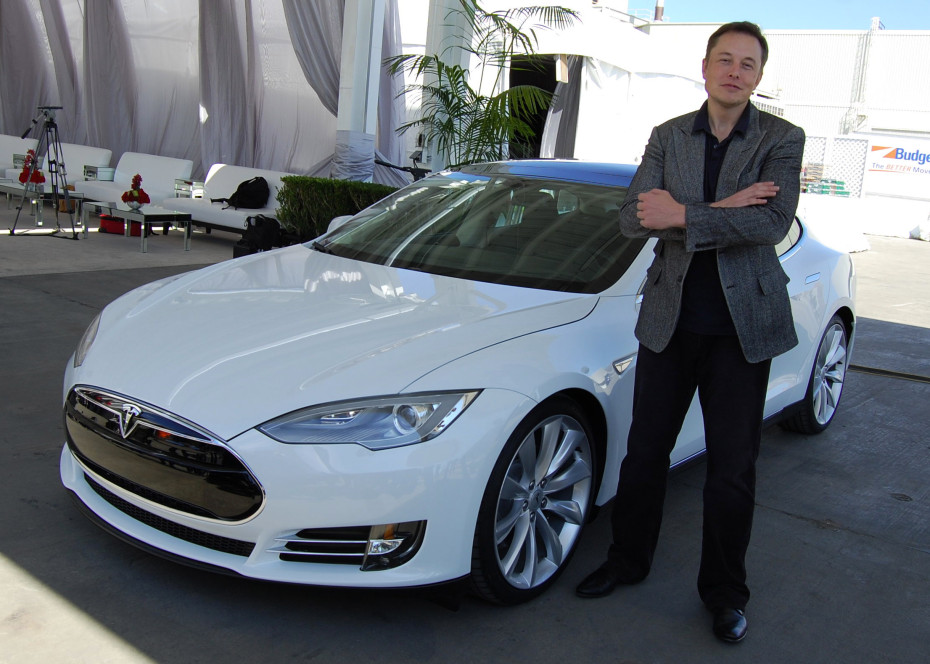Electric cars will turn the world upside down
 |
| Elon Musk has changed the game |
Elon Musk could likely have more influence on America's future foreign policy than whoever ends up as president.
Musk has promised that his Model S all-electric car will be able to match the driving distance of a gas-powered sedan at a comparable $30,000 price tag by 2020.
Today, Musk is $5,000 off on price, but three years ahead of schedule. If Musk and the other automakers can pull this off, the geopolitical effects will be greater than anything since World War II. Maybe even greater.
The investment ratings company Fitch thinks Musk and company will pull it off. They recently issued an unprecedented warning, calling the rise of electric vehicles a potential "death spiral" for energy companies.
Goldman Sachs thinks at least a quarter of all cars sold by 2025 will have, at a minimum, hybrid electric drivers. Fitch argues that it is not implausible that a decision by China to go all-in and mandate electric cars could tear the bottom out of the energy market.
Nearly all other experts are saying that the oil industry is facing a "resoundingly negative" market outlook, with arguments only over timeframes–will decline happen in 2030 or 2060?
What no one is really talking about, however, is the impact a rapidly declining carbon economy will have on the global order. Saudi Arabia and the Gulf states will face increasing pressure from populations long accustomed to the lavish wealth of the petro-state economy.
Predicated on top-price barrels, social spending will decrease alongside the ability to, in-effect, buy-off certain segments of society. Moreover, lesser oil powers in the region like Yemen, Syria, Libya, Tunisia, Sudan and South Sudan will almost certainly see competition intensify, at a likely cost to political stability.
Major global powers will also face political and economic uncertainty. Russia faces long-term economic decline under these conditions. If Putin, already 64 years old, leaves power in a decade, the succession crisis to come will happen in the context of shrinking oil and gas revenue and a plummeting population.
Oil revenues fill about half of the Kremlin's budget today, and that's a big hit to sustain for a decade. Additionally, much of Russia's aggressiveness can be traced to a toxic brew of Eurasianist nationalism and a weak economy overly dependent on energy. Countries where the leadership has squandered its wealth on the oligarchy instead of investing in its people will not fare well through this kind of change.
China, too, will face a choice like Russia's. But unlike Moscow, the leadership in Beijing has been expanding its economic base and improving its educational system for decades. China's choice is whether to force the transformation forward on its terms, or adapt more slowly over time.
As Fitch notes, a Chinese fiat to convert to electric vehicles in a few years would only accelerate the blow to oil companies. But aside from economic considerations, this choice puts a powerful tool in China's foreign policy arsenal.
A fast adoption of electric vehicle technology in China's huge market might land like a hammer on a Russia ill-prepared to adapt. How would Putin's successor, possibly caught up in a tight power-struggle, be likely to respond? Or how would such a move affect its rival, India–the second largest oil producer in Asia? For a country prepared for the transformation, there are many opportunities to expand power by forcing competitors to failure.
The United States will fare comparatively well in the midst of this tectonic shift in the world economy. After all, America is home to Musk and other post-carbon innovators, and its economy has long since broadened beyond oil and gas.
The U.S. will also remain the indispensable nation in world affairs. American diplomacy and military force will be involved in nearly every tension point during this transition.
The world that emerges in a market with little oil and a lot of electric, will be shaped to a large degree by what the next U.S. President does. The next administration stands at the precipice of a new world and must be prepared to understand the fragility, manage the dangers, and above all, harness the opportunities.
Electric cars will change more than how we drive; they will drive the biggest overhaul of the political strategic order in generations.
Matthew Schmidt is assistant professor of national security and political science at the University of New Haven. Newsweek
